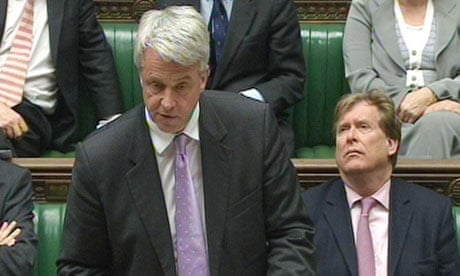A global consultancy firm seeking to profit out of the fallout from the shake-up to the NHS is being paid £250,000 a year by the government for advice on the transition towards health secretary Andrew Lansley's vision of the service.
The American firm, McKinsey Inc, with estimated revenues of £4.1bn a year, has been advising the Department of Health on how best to manage the radical changes since March. McKinsey is also one of a group of private consultants that have united to provide paid-for advice to GPs as they prepare for life after the reforms.
Family doctors need help from private companies because of the government's decision to abolish primary care trusts as part of their controversial changes to the health service, a move criticised as a step towards privatisation.
McKinsey's advisory services emerged in a freedom of information release published on the department's website. The job description says: "Consultancy services in support of the NHS transition programme".
The company was one of 57 external "organisation and change" management consultants paid almost £5.5m by the government in the last financial year.
It is unclear how McKinsey is assisting. However, in September this newspaper revealed the company had been acting as a middleman between Lansley's department and international firms, including the German company Helios, which was at one time interested in taking over selected NHS hospitals.
Christina McAnea, head of health at the Unison union, said the revelation was evidence of the increasing hold private companies had over health policy. She said: "It is clear that the Tory government's direction of travel for the NHS is towards privatisation and they are increasingly open about that.
"But what is also becoming obvious is the close relationships being built between this Conservative government and the private companies who are making, or want to make, a profit from the reforms in the health and social care bill. It is worrying for everyone, but particularly patients, because this is money that should be spent on their care."
The total paid to consultants by the department, including IT and legal professionals, in the last year was £9.7m, despite the government's claims to be cutting down on extraneous spending on management consultancy firms.
The department is currently employing 114 contractors, and leaked documents seen by the Observer reveal the generous daily rates of pay the government is now offering private firms for their advice.
The government rate card shows that consultants can earn up to £1,870 a day each working for the civil service. A junior consultant can earn £400 a day. A three-month contract for a top consultant could net their company almost £120,000 for just 60 days' work.
Gareth Thomas, Labour's shadow minister for civil society, said: "When the rest of the country is struggling to make ends meet and jobs are being axed, the government should be clamping down on excessive pay to consultants. Ministers need to be transparent and explain why so many consultants on such high pay are needed and whether they approved these contracts or not."
McKinsey has long been a controversial figure in the health world, and has made millions of pounds as one of the key private providers of management and advisory services. A conglomerate including McKinsey, KPMG and PricewaterhouseCoopers last week sealed a £7.1m contract with 31 groups of GPs looking for advice on how to manage budgets under the system being introduced by the Lansley reforms.
Earlier this summer this newspaper revealed the existence of confidential emails between McKinsey and the government showing that the firm had helped the department to hold discussions last year about "international players" running up to 20 NHS hospitals.
The emails suggested there had been "good discussions" on "how international hospital provider groups may help to tackle the performance improvement of English hospitals".
It said there was "interest in [a] new solution for 10 to 20 hospitals", but said this would be "starting from a mindset of one at a time" due to "various political constraints".
The consultants suggested that a figure of £500m revenue "on the table" and a "free hand on staff management" would be needed for "international players" to run hospitals.
Private involvement has been suggested as a solution for NHS trusts with financial difficulties that may not be able to attain foundation trust status. One hospital trust, Hinchingbrooke Health Care, is already set to be run in a franchise arrangement by the private firm Circle, although the deal has been delayed awaiting ministerial sign-off.
Further correspondence between McKinsey and a health department manager revealed the department had held discussions with Helios, which runs a number of hospitals. The agenda for a meeting between the consultants and the department in February next year includes the item "London/Helios discussion". The German firm has since said it is no longer interested in moving into the UK market.
A spokesman for McKinsey declined to comment.






Comments (…)
Sign in or create your Guardian account to join the discussion